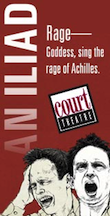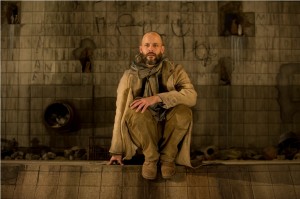A HOMER RUN
One-actor shows are by their nature demanding, but Timothy Edward Kane’s volcanic storytelling in An Iliad is a stunning marvel. This retelling of the famous epic The Iliad – attributed to the ancient Greek poet Homer – is an exceptionally staggering test of a performer’s physical and emotional resources.
The adaptation is not a straight reading of The Iliad (for Iliad idolaters, the Court sponsored the “Homerathon,” a 24-hour reading of the complete epic on the Court stage). This variation mixes excerpts from the poem with modern interjections, a few of them comic and flippant, but most of them stark contemporary commentaries on the hell that is warfare.
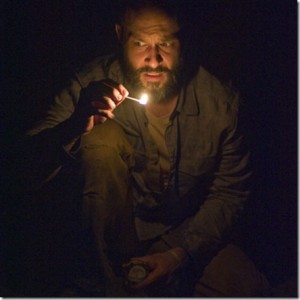 Homer’s epic portrays the last days of the Trojan War between the invading Greek armies and the city of Troy. At the time the poem opens, the two warring sides had been at it for nine bloody and exhausting years; the Greeks, led by their hero warrior Achilles, finally overwhelm the Trojans.
Homer’s epic portrays the last days of the Trojan War between the invading Greek armies and the city of Troy. At the time the poem opens, the two warring sides had been at it for nine bloody and exhausting years; the Greeks, led by their hero warrior Achilles, finally overwhelm the Trojans.
Kane addresses the audience directly as a nameless poet dressed in grungy modern clothes (design by Rachel Healy). He never misses a beat in his narration while, at some hazard, he frequently dashes up and down the steep incline on Todd Rosenthal’s set, which conveys the crumbling ramparts of a city wall. Kane is in continual motion: often he descends to the front of the stage, talking intimately to the audience; another time he retreats to the rear of the stage, speaking from halfway up an iron ladder. This is the most animated one-person play ever seen.
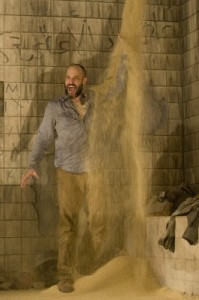 Kane starts with some banter (and a few quotations recited in ancient Greek) before launching into the story. Adapted by Denis O’Hare and Lisa Peterson from a highly praised modern translation by Robert Fagles, An Iliad covers the essential narrative points in the epic, including how Achilles petulantly retired to his tent and refused to fight after being insulted by the Greek military leader Agamemnon. With Achilles removed from the action, the Trojans, led by Hector, drive the Greek forces to the edge of the sea. But after his friend Patroclus dies in battle, the enraged Achilles returns to fight and leads a massacre of the Trojans and the death of King Priam’s son Hector. The final scene portrays the King’s supplication to Achilles for the body of Hector so the man could receive an honorable Trojan burial. It’s a beacon of humanity in a story largely devoted to carnage and political infighting.
Kane starts with some banter (and a few quotations recited in ancient Greek) before launching into the story. Adapted by Denis O’Hare and Lisa Peterson from a highly praised modern translation by Robert Fagles, An Iliad covers the essential narrative points in the epic, including how Achilles petulantly retired to his tent and refused to fight after being insulted by the Greek military leader Agamemnon. With Achilles removed from the action, the Trojans, led by Hector, drive the Greek forces to the edge of the sea. But after his friend Patroclus dies in battle, the enraged Achilles returns to fight and leads a massacre of the Trojans and the death of King Priam’s son Hector. The final scene portrays the King’s supplication to Achilles for the body of Hector so the man could receive an honorable Trojan burial. It’s a beacon of humanity in a story largely devoted to carnage and political infighting.
The adaptation extends Homer’s story into a condemnation of mankind’s insatiable lust for war throughout human history. The most remarkable moment in the play comes when Kane recites a litany of wars from ancient times to today’s conflict in Afghanistan. It’s an astounding feat of memory as well as a stirring cautionary statement that war has always been with us, in all times and in all places.
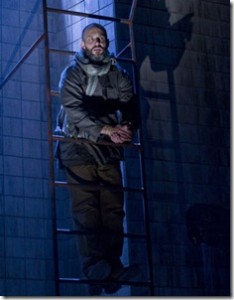 Kane has thoroughly invested himself in the story as he roams around the stage, shouting and whispering and gesticulating as the narrative shifts in mood, and occasionally pausing to drink from a canteen while he collects himself emotionally. By bringing the story alive in all its sweep and violence, Kane makes it both accessible and relevant to the modern spectator. For middle and high school students, his performance would be a wonderful introduction to one of the great works of world literature.
Kane has thoroughly invested himself in the story as he roams around the stage, shouting and whispering and gesticulating as the narrative shifts in mood, and occasionally pausing to drink from a canteen while he collects himself emotionally. By bringing the story alive in all its sweep and violence, Kane makes it both accessible and relevant to the modern spectator. For middle and high school students, his performance would be a wonderful introduction to one of the great works of world literature.
Charles Newell directs, and how much of the action comes from Newell and how much emerges directly from Kane is impossible for the spectator to identify. But the performance comes across as a seamless whole, unfolding with riveting inevitability. It’s a marvel of commitment from a talented actor at the top of his game, operating within a striking physical production of theatrical lighting (Keith Parham) and haunting, mood-enhancing sound (Andre Pluess). The extraordinary and complex lighting includes a single match flickering in a darkened theater, a blinding searchlight and other dramatic expressionist effects.
Everyone at the Court has captured theatrical lightning in a bottle in this extraordinary merging of technical wonder, a brilliant performance and one of literature’s great stories. They all share honorably in one of the events of the season in Chicagoland theatre.
photos by Michael Brosilow
An Iliad
Court Theatre
ends on December 11, 2011
for tickets, visit Court Theatre
for more shows, visit Theatre in Chicago
